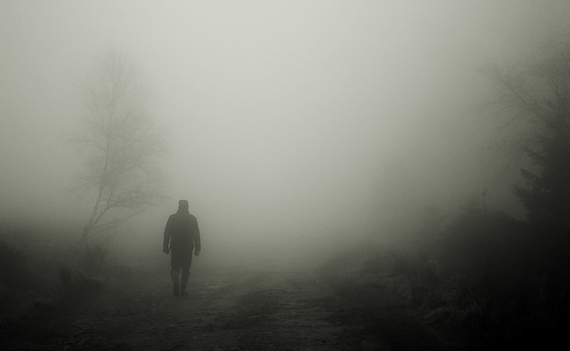In the first book of the Book of Mormon, a prophet named Lehi narrates an allegorical vision that has become a hallmark of Mormon religious discourse. In this dream he saw "the tree of life," whose fruit brought joy and peace to anyone who partook of it. In the dream there were many people who desired to eat of this fruit, but they had to face a variety of obstacles to arrive at the tree. In order to arrive and partake of the fruit, the people were required to cross a barren wasteland through mists of darkness. There were aids to help them along the way, but still the mists of darkness often shrouded the blessed tree from sight, leaving the travelers in a state of confusion, apprehension, and spiritual darkness. Many of the travelers never made it to the tree.
Each element of this dream is symbolic of our journey in life to find happiness and spiritual rest. We are the travelers, and the mists of darkness represent the temptations that we face in this life. Life is meant to bring us joy, but because of the nature of our earthly experience, we will inevitably encounter mists in our own lives. These mists of darkness work to impede the progress of all those who pursue lasting happiness and contentment. Getting out of the dark is key to eternal happiness.
More specifically, what are the mists we face in our lives? As stated before, the mists are temptations. A traditional understanding of temptation might define temptation as being the pressure to act contrary to what is right and good, by attracting someone to participate in activities contrary to true and lasting happiness. This aspect of temptation can be seen in the imagery of the mists, which shroud the eyes and may cause one to look to other places as sources of counterfeit happiness. However, I feel like the imagery of the mists also illustrates two additional ways in which our adversary may misdirect or distort our vision in regards to our glorious destination. These two additional ways are the acts of distracting and detracting. To distract is to move someone's attention away from the ultimate goal; it is to create a lapse in the persistent pursuit of the very best. To detract is to make something desirable appear not so great, or not worth the effort. The phrase "mists of darkness" powerfully invokes an image that implies all of the binding and blinding aspects of temptation: attraction, distraction, and detraction. To further understand these concepts, I have adopted the use of the term smokescreen.
In a visual sense a smokescreen is a barrier that blocks out light, concealing something behind it that someone intends for someone else not to see. It is a visual filter, allowing only certain aspects of an occurrence to show through, leaving a fragmented understanding of what is on the other side. Similarly, Satan has a way of creating ideological smokescreens that obscure the truth and make it hard for us travelers to focus on and appreciate the brilliance of our glorious destination. In essence a smokescreen is anything that interferes with a pure and unpolluted appreciation of our potential if we were to remain diligent on God's path.
As stated before, these smokescreens are ideological. Though these smokescreens may result from outside influences, their effect occurs principally in the mind. Social prejudices such as racism or sexism are examples of smokescreens, as they inhibit the fortification of relationships through mutual understanding. Smokescreens, like wedges, split and segregate. Oftentimes the extreme opposite of a smokescreen is also a smokescreen. The opposite extreme relative to racism is hypersensitivity to race, which can create fear of racial distinctions and diversity, crippling potentially beautiful and appreciative relationships. Two other extremes that serve as smokescreens include excessive tolerance to sexual promiscuity and excessive prudishness. These extremes blind us from pursuing the very best. Yet unfortunately many people harbor smokescreens with pride, regarding them as virtues and instruments of discernment. But such pet smokescreens destroy one's vision of good things to come. Smokescreens are the enemies of happiness.
How do we overcome smokescreens? Before reaching the tree of life, the prophet Lehi found himself lost in a dark and dreary wilderness. It was not until he prayed that the Lord would have mercy on him that the Lord showed him the way to the tree (1 Nephi 8:8). Jesus said, "Watch and pray, that ye enter not into temptation: the spirit indeed is willing, but the flesh is weak" (Matthew 26:41). Prayer helps us to gain the company of the Holy Spirit, which can help us to gain an eternal perspective and see beyond smokescreens, thus strengthening our spiritual eyes and allowing us to walk by faith, not by sight.
There will always be smokescreens to overcome in our lives; this is just part of our mortal experience. And though we may feel uncomfortable when these smokescreens come, we need not feel guilty. Paul said in 1 Corinthians 10:13, "There hath no temptation taken you but such as is common to man." We are all human, and will all be tempted. Feeling guilty for being tempted is unwise and unhealthy, and is a smokescreen in and of itself, as it detracts from the simple pleasure of learning and growing by experience and through decision-making. When the smokescreens of life would shroud our minds, let us remember the words of James: "Blessed is the man that endureth temptation: for when he is tried, he shall receive the crown of life, which the Lord hath promised to them that love him" (James 1:12).
